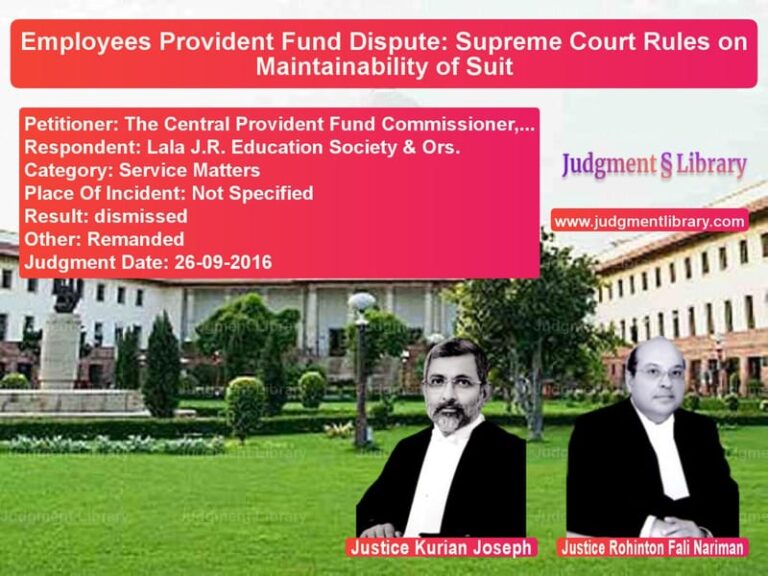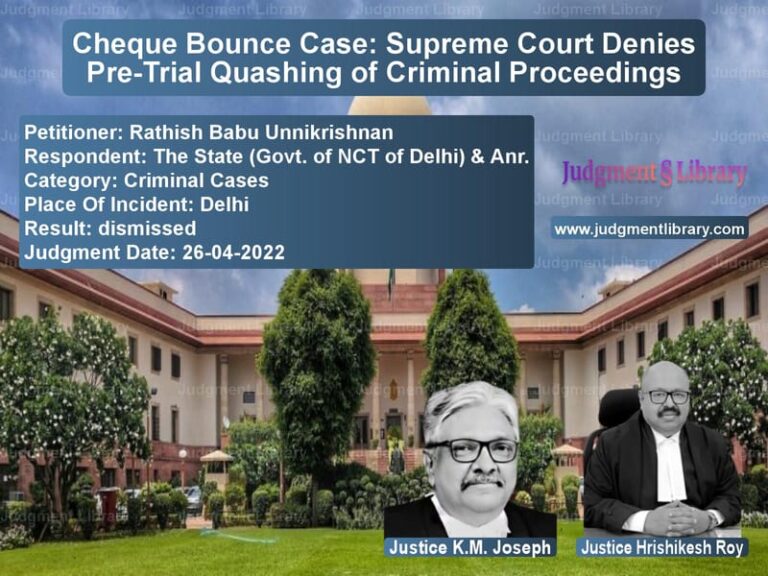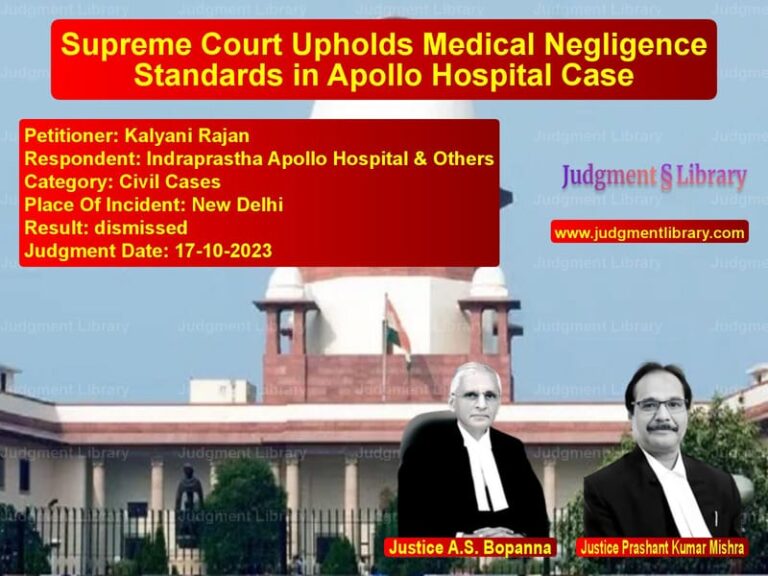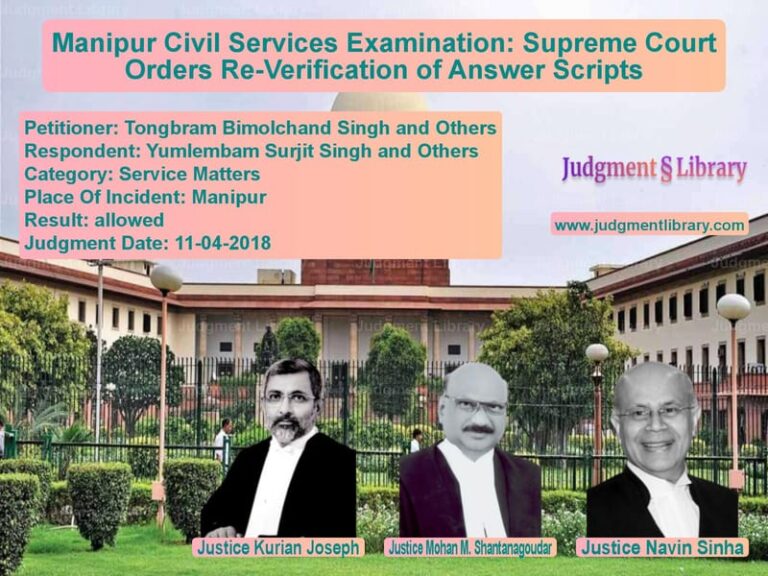Acquittal in Assam Murder Case: Supreme Court Ruling on Circumstantial Evidence
The Supreme Court of India recently ruled on a crucial criminal appeal in the case of Md. Bani Alam Mazid @ Dhan v. State of Assam, addressing the evidentiary limitations of circumstantial cases. The case revolved around allegations of abduction and murder of a minor girl in Assam, with the appellant accused of kidnapping and killing her. The ruling emphasized the principles governing circumstantial evidence and the necessity of proving a complete chain of incriminating circumstances to secure a conviction.
Background of the Case
The case originated from an FIR lodged on August 26, 2003, by Amzad Ali (PW-1), who alleged that his daughter, Marjina Begum (16 years old), had been kidnapped by the appellant and his accomplice, Mohd. Jahangir Ali. The prosecution contended that she was last seen alive with the appellant, and her dead body was later discovered near the railway tracks.
After an investigation, the appellant was charged under Sections 366(A) (kidnapping), 302 (murder), and 201 (causing disappearance of evidence) of the Indian Penal Code (IPC). The trial court convicted him, sentencing him to life imprisonment. The Gauhati High Court upheld the conviction, leading to the present appeal before the Supreme Court.
Arguments Presented
Petitioner’s Arguments
The appellant’s counsel, Mr. Ajim H. Laskar, argued:
- The case was based entirely on circumstantial evidence, lacking direct proof of the appellant’s involvement.
- The ‘last seen together’ theory was not conclusive, as the deceased was seen with the appellant several days before her body was discovered.
- The appellant and the deceased were in a romantic relationship, and there was no conceivable motive for him to kill her.
- Extra-judicial confessions made in police presence were inadmissible under Sections 25 and 26 of the Indian Evidence Act.
- There was no forensic evidence linking the appellant to the murder.
Respondents’ Arguments
The prosecution, representing the State of Assam, contended:
- The appellant was last seen with the deceased, and he failed to explain her whereabouts after that.
- The discovery of the dead body was based on information provided by the accused, making it admissible under Section 27 of the Evidence Act.
- The presence of injuries on the deceased’s body indicated that she was strangulated, supporting the prosecution’s theory of murder.
Supreme Court’s Observations and Judgment
After reviewing the evidence, the Supreme Court ruled in favor of the appellant, emphasizing the weaknesses in the prosecution’s case.
Key observations by the Court:
- “Where a case rests squarely on circumstantial evidence, inference of guilt can be justified only when all the incriminating facts and circumstances are found to be incompatible with the innocence of the accused.”
- “The circumstance of last seen together does not by itself lead to the inference that it was the accused who committed the crime. There must be something more to establish the nexus between the accused and the crime.”
- “The prosecution failed to prove beyond reasonable doubt that the appellant was the sole perpetrator of the crime.”
- “In a case of circumstantial evidence, motive plays a crucial role. The prosecution did not establish any motive for the appellant to commit the crime.”
Final Judgment
The Supreme Court set aside the convictions under Sections 302 and 201 IPC and directed the immediate release of the appellant unless he was required in any other case. The judgment reaffirmed the principle that suspicion, however strong, cannot replace proof beyond reasonable doubt.
Impact of the Judgment
This case serves as an important precedent in criminal law, particularly in cases relying on circumstantial evidence. It highlights:
- The necessity of proving a complete chain of incriminating circumstances.
- The inadmissibility of extra-judicial confessions made in police custody.
- The critical role of motive in cases based solely on circumstantial evidence.
- The principle that the burden of proof always lies on the prosecution.
The ruling is expected to impact similar cases where circumstantial evidence alone is relied upon to establish guilt, reinforcing the need for rigorous legal standards in criminal prosecutions.
Petitioner Name: Md. Bani Alam Mazid @ Dhan.Respondent Name: State of Assam.Judgment By: Justice Abhay S. Oka, Justice Ujjal Bhuyan.Place Of Incident: Assam.Judgment Date: 24-02-2025.
Don’t miss out on the full details! Download the complete judgment in PDF format below and gain valuable insights instantly!
Download Judgment: md.-bani-alam-mazid-vs-state-of-assam-supreme-court-of-india-judgment-dated-24-02-2025.pdf
Directly Download Judgment: Directly download this Judgment
See all petitions in Murder Cases
See all petitions in Bail and Anticipatory Bail
See all petitions in Judgment by Abhay S. Oka
See all petitions in Judgment by Ujjal Bhuyan
See all petitions in allowed
See all petitions in supreme court of India judgments February 2025
See all petitions in 2025 judgments
See all posts in Criminal Cases Category
See all allowed petitions in Criminal Cases Category
See all Dismissed petitions in Criminal Cases Category
See all partially allowed petitions in Criminal Cases Category







